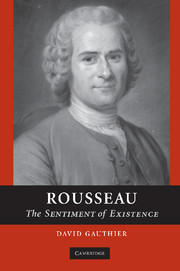2 - Making a Man
Published online by Cambridge University Press: 29 March 2010
Summary
“Everything is good as it leaves the hands of the Author of things; everything degenerates in the hands of man.” (Bl.37, OC4.245) In these opening words of Emile, Rousseau reminds us of his story of the Fall. Now we must join him in making a new beginning. We shall take an infant, as yet uncorrupted by his fellows and his society, and we shall ask if he may be made a man – not one of the denatured and alienated men of Rousseau's time, or of today, not a man driven by amour propre to take the sentiment of his existence only from the regard of another, but a man who is “born free” (in the opening words of the Social Contract) and who lives as he was born.
Rousseau's conception of freedom or liberty is focused on the adequacy of each person's powers to meet his or her needs and desires. In this sense, the idea of being born free is not that one is able to provide adequately for oneself at birth, but rather that one is born to freedom – that one naturally comes to maturity as a being whose powers are adequate for his needs and desires. Our first ancestors were born to freedom, and came to it; we today are still born to freedom, but we do not come to it – as we mature, we acquire desires and passions that can be satisfied, not by our own powers, but only through the powers of our fellows.
- Type
- Chapter
- Information
- RousseauThe Sentiment of Existence, pp. 27 - 51Publisher: Cambridge University PressPrint publication year: 2006



